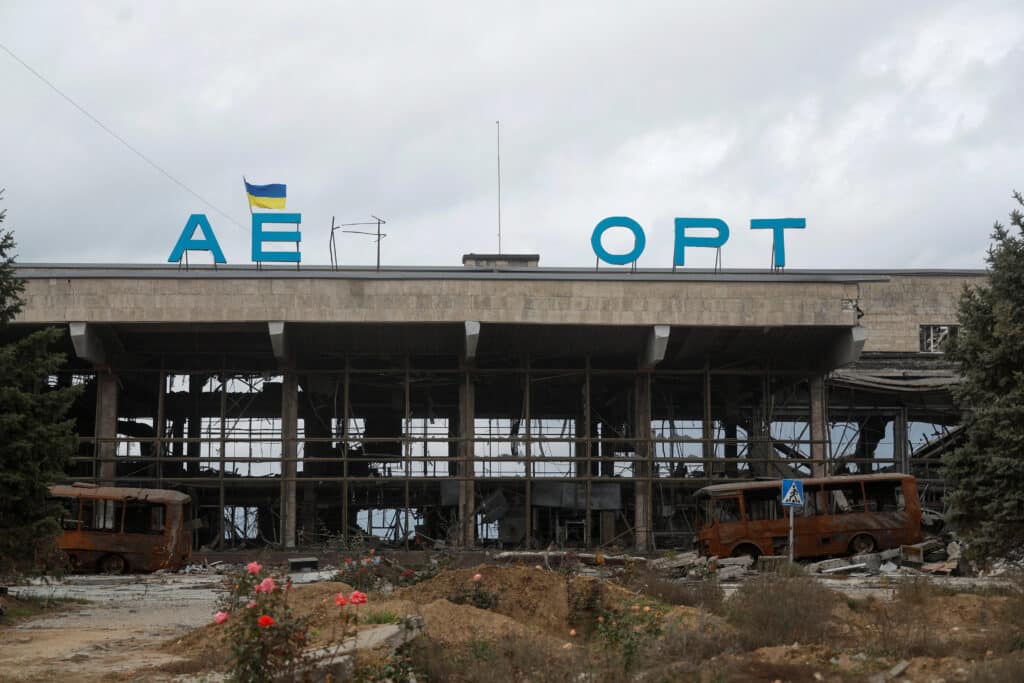Ukraine said it faced fierce attacks in the east from Russian forces reinforced with troops withdrawn from Kherson in the south, while NATO and Poland concluded a missile that crashed in Poland was probably a stray fired by Ukraine’s air defences.
The government in Kyiv was working to restore power across the country on Wednesday after intense Russian strikes on civilian infrastructure earlier in the week, officials said.
NATO ambassadors held emergency talks on Wednesday to respond to Tuesday’s blast that killed two people at a grain facility in Poland near the Ukrainian border, the war’s first deadly extension into the territory of the Western alliance.
“From the information that we and our allies have, it was an S-300 rocket made in the Soviet Union, an old rocket and there is no evidence that it was launched by the Russian side,” Polish President Andrzej Duda said. “It is highly probable that it was fired by Ukrainian anti-aircraft defence.”
The old S-300 rocket was being used by both Russia and Ukraine.
Nevertheless, NATO’s chief said that Russia, not Ukraine, was still to blame for starting the war with its February invasion and launching scores of missiles on Tuesday that triggered Ukrainian defences.
“This is not Ukraine’s fault. Russia bears ultimate responsibility as it continues its illegal war against Ukraine,” NATO Secretary-General Jens Stoltenberg told reporters in Brussels.
Stoltenberg also said it was likely to have been a Ukrainian air defence missile. Earlier, U.S. President Joe Biden had said the trajectories suggested the missile was unlikely to have been unleashed from Russia. Russia denied responsibility.
Ukrainian President Volodymyr Zelenskiy demurred, saying “I have no doubt that it was not our missile”, Ukrainian media reported on Wednesday. He said he based his conclusion on reports from Ukraine’s military which he “cannot but trust”.
He gave no evidence for his position and, in a nightly video address, urged that Ukraine be included in the investigation of the explosion site in Poland in order to determine the facts.
Asked about the discrepancy in accounts from Ukraine, Poland and NATO, a State Department spokesperson in Washington said, “We are aware of President Zelenskiy’s comments … but we do not have any information that would contradict Poland’s preliminary findings.”
Russia’s Foreign Ministry said the “mayhem” around accusations of Russian involvement in the missile were “part of a systematic anti-Russian campaign by the West.”
The missile incident occurred while Russia was firing scores of missiles at cities across Ukraine, targeting its energy grid and worsening power blackouts for millions, in what Ukraine says was the most intense volley of such strikes of the nine-month-long war.
DONETSK FIGHTING
Meanwhile, fighting was heavy in the eastern Donetsk region including in the towns of Pavlivka, Vuhledar, Maryianka and Bakhmut, Ukrainian presidential adviser Oleksiy Arestovych said in an online video.
Ukrainian forces had repelled attacks on the Donetsk towns of Avdiivka and Bilohorivka, Ukrainian military analyst Oleh Zhadnov said in comments posted on YouTube.
Moscow’s forces retreated from the southern city of Kherson last week after a Ukrainian counteroffensive. It was the only regional capital Russia had captured since its Feb. 24 invasion, and the pullback was the third major Russian retreat of the war.
“These (Russian) troops now have in part redirected from Kherson region and … will be allocated to the ‘liberation’ of Donetsk and Luhansk” in the eastern industrial region known as the Donbas, Arestovych said.
“The Kherson operation is turning into a regrouping. They are starting to redeploy in Donetsk,” Zhdanov said.
Arestovych said redeployed Russian forces have also gone on the attack in the southern Zaporizhzhia region and may be planning to launch another offensive in Kharkiv in the north, where they were pushed back by Ukraine earlier in the conflict.
The top U.S. general, Army General Mark Milley, chairman of the Joint Chiefs of Staff, played down the chances of any near-term, outright military victory by Ukraine, cautioning that Russia still had significant combat power inside Ukraine despite a string of setbacks.
SEEKING TO RESTORE POWER
Zelenskiy said late Wednesday that technicians had worked nonstop to restore power. In 18 regions and Kyiv, emergency power cuts as well as blackouts to stabilise the grid were continuing, he said.
“We are talking about millions of customers. We are doing everything we can to bring back power. Both generation and supply,” Zelenskiy said.
Plans were made to provide power to parts of Izium, Balakliya and Kupiansk, three areas freed from Russian occupation in September and October, Kharkiv regional governor Oleh Synehubov said on Telegram.
Elsewhere, a United Nations source on Wednesday said they have reasons to be “cautiously optimistic” on the renewal of a Black Sea grains export agreement, which is set to roll over on Saturday unless there are objections.
The U.N.-backed agreement on July 22 allowed grain shipments to resume from certain Ukrainian ports on the Black Sea, leading to some 10 million tonnes in shipments and helping to reduce international food prices.

